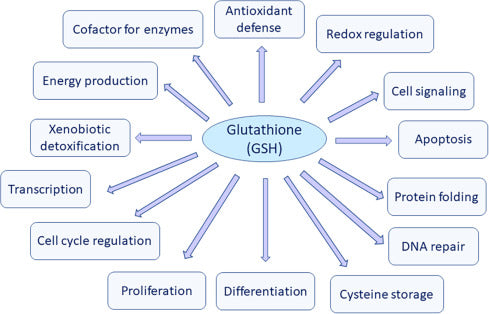

What Is Glutathione: The Master Antioxidant
Table of Contents
Glutathione is a powerful antioxidant that plays a vital role in maintaining optimal health and wellness. Often referred to as the "master antioxidant," it helps to protect cells from the damaging effects of free radicals and other harmful substances. But what exactly is glutathione, and why is it so important for our overall well-being?
In this blog post, we will explore the many benefits of glutathione, including how it can help to boost our immune system, improve our energy levels, and protect against chronic disease.
What Is Glutathione?
Glutathione is a potent antioxidant that safeguards cells against damage and supports detoxification, immune function, and cell growth. Stress, poor nutrition, and environmental toxins can lower glutathione levels. Deficiency in glutathione has been associated with health issues like liver disease and neurodegenerative disorders. Increasing glutathione levels may help combat oxidative stress and inflammation.
Benefits of Glutathione
Antioxidant Defense:
Glutathione serves as a primary defender against oxidative stress by neutralizing free radicals and reactive oxygen species (ROS). These harmful molecules can damage cellular structures, including DNA, proteins, and lipids. By scavenging these radicals, glutathione helps protect cells from oxidative damage and supports overall cellular health.
Detoxification:
One of glutathione's essential roles is in the detoxification process. It binds to toxins, heavy metals, and xenobiotics, facilitating their removal from the body. This detoxification function is particularly crucial in the liver, where glutathione helps transform harmful substances into water-soluble compounds that can be excreted through urine or bile.
Immune System Support:
Glutathione plays a pivotal role in supporting the immune system. It enhances the activity of various immune cells, including T cells and natural killer cells, which are vital for identifying and eliminating pathogens. Additionally, glutathione regulates the production of cytokines, which are signaling molecules that modulate immune responses.
Cellular Repair and Regeneration:
The tripeptide structure of glutathione (composed of three amino acids: cysteine, glutamic acid, and glycine) is crucial for cellular repair and regeneration. It aids in the synthesis of DNA and proteins, contributing to the maintenance and renewal of healthy tissues and organs.
Anti-Inflammatory Effects:
Glutathione has been associated with anti-inflammatory effects. By modulating the activity of immune cells and suppressing the production of pro-inflammatory cytokines, glutathione may help alleviate chronic inflammation, which is implicated in various diseases, including cardiovascular conditions and neurodegenerative disorders.
Skin Health:
Glutathione is often recognized for its potential role in promoting skin health. Some individuals use glutathione supplements for skin lightening, although the mechanisms behind this effect are not fully understood. It is suggested that glutathione may influence melanin production, the pigment responsible for skin color, and contribute to a brighter complexion.
Respiratory Health:
Glutathione plays a protective role in the respiratory system. It helps defend the lungs against oxidative stress, and its levels are particularly high in the fluid lining the airways. This antioxidant function is crucial for maintaining the integrity of respiratory tissues and supporting lung function.
Neuroprotection:
Glutathione is essential for maintaining optimal function in the central nervous system. It protects neurons from oxidative damage and is involved in various processes related to neurotransmitter regulation. Low levels of glutathione have been associated with neurodegenerative disorders, highlighting its potential neuroprotective effects.
Which is better reduced or liposomal glutathione: The Difference (Check Here)

How to Increase Glutathione Levels?
There are several ways to increase glutathione levels in the body:
Diet:
- Sulfur-rich Foods: Foods high in sulfur, such as garlic, onions, cruciferous vegetables (broccoli, Brussels sprouts, cabbage), and eggs, provide the building blocks for glutathione production.
Supplements:
- N-acetylcysteine (NAC): NAC is a precursor to glutathione and can help boost its levels. It is available as a supplement and is commonly used to support respiratory health.
- Glutathione Supplements: While direct supplementation with glutathione is available, its effectiveness is debated. Some studies suggest that taking oral glutathione may not effectively raise the body's glutathione levels.
Vitamins and Minerals:
- Vitamin C: This vitamin supports glutathione recycling, helping it work more efficiently.
- Vitamin E: Like vitamin C, vitamin E supports the recycling of glutathione.
- Selenium: This trace element is a cofactor for the enzyme that helps recycle glutathione.
Milk Thistle:
- The active ingredient in milk thistle, silymarin, has been suggested to increase glutathione levels.
Regular Exercise:
- Regular physical activity has been associated with higher glutathione levels. Both aerobic and strength training exercises can contribute to this.
Adequate Sleep:
- Ensuring you get enough quality sleep is important for overall health and may contribute to higher glutathione levels.
Reducing Stress:
- Chronic stress can deplete glutathione levels. Practicing stress-reducing activities such as meditation, deep breathing, and yoga may be beneficial.
Avoiding Toxins:
- Minimizing exposure to environmental toxins, pollutants, and chemicals can help preserve glutathione levels.
It's essential to consult with a healthcare professional before making significant changes to your diet or starting new supplements, especially if you have underlying health conditions or are taking medications.
What Foods Contain Glutathione?
Food Group |
Foods |
|
Fruits and Vegetables |
Avocado, spinach, asparagus, okra, broccoli, garlic, onions, kale, Brussels sprouts, squash, zucchini, and watermelon. |
|
Protein Sources |
Fish (especially cod), poultry, eggs, whey protein, and lean meats. |
|
Nuts and Seeds |
Almonds and walnuts. |
|
Dairy Products |
Milk and yogurt. |
|
Herbs and Spices |
Turmeric and cinnamon |
|
Selenium-Rich Foods |
Brazil nuts, sunflower seeds, fish, shellfish, and turkey. |
|
Sulfur-Rich Foods |
Garlic, onions, leeks, shallots, and cruciferous vegetables (e.g., broccoli, cabbage, cauliflower). |
|
Folate-Rich Foods |
Lentils, beans, spinach, asparagus, and avocados. |
|
Vitamins and Minerals |
Vitamins C and E, as well as selenium, which can be found in various fruits, vegetables, nuts, and seeds. |

How Does Glutathione Work?
Glutathione functions as a potent antioxidant, combating free radicals and oxidative damage. It supports the effectiveness of other antioxidants and aids in their regeneration. Additionally, glutathione plays a vital role in detoxification by binding to toxins and facilitating their elimination. Furthermore, it contributes to protein synthesis and cellular growth, promoting overall health.
What is the Best Glutathione Supplement For Your Need? (Check Here)
Forms of Glutathione
Form of Glutathione |
Description |
|
Reduced Glutathione (GSH) |
The active, antioxidant form of glutathione. It plays a crucial role in neutralizing free radicals and supporting cellular health. |
|
Oxidized Glutathione (GSSG) |
This is the form of glutathione that has donated its electrons to neutralize free radicals. It can be converted back to GSH through enzymatic processes. |
|
Liposomal Glutathione |
Glutathione encapsulated in liposomes, which are small, artificial spheres made of phospholipids. This form is believed to enhance absorption and bioavailability. |
|
Acetyl Glutathione |
Glutathione combined with an acetyl group. Some claim that acetyl glutathione is more stable and has better absorption than regular glutathione, although this is a topic of debate. |
|
Glutathione Precursors (e.g., N-acetyl-cysteine, Glycine, Glutamine) |
Substances that the body can use to produce glutathione. These precursors contribute to the synthesis of glutathione within cells. |
|
S-Acetyl Glutathione |
Another acetylated form of glutathione. Some suggest that it may have better stability and absorption compared to regular glutathione, but research is ongoing. |
|
L-Glutathione and Reduced L-Glutathione |
These terms may be used interchangeably with reduced glutathione (GSH). "L" refers to the natural, biologically active form of the amino acid. |
Which form of glutathione is best? (Check Here)
Skin Lightening with Glutathione (Check Here)
Let’s Sum Up
Glutathione, often referred to as the master antioxidant, plays a crucial role in maintaining overall health and well-being. It helps protect our cells from damage caused by free radicals and toxins, supports the immune system, and promotes detoxification. While our bodies naturally produce glutathione, certain factors such as aging, stress, poor diet, and exposure to toxins can deplete its levels.
If you're looking to achieve skin lightening effects with glutathione, it's important to consult with a dermatologist or healthcare professional who can guide you through safe and effective methods.


















